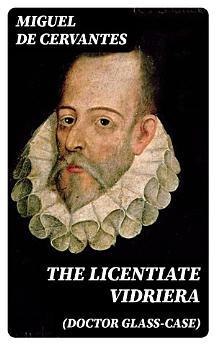The Licentiate Vidriera (Doctor Glass-Case)
Sep 2022 · DigiCat
Ebook
26
Pages
family_home
Eligible
info
reportRatings and reviews aren’t verified Learn More
About this ebook
In "The Licentiate Vidriera (Doctor Glass-Case)," Miguel de Cervantes crafts a rich narrative exploring themes of madness, identity, and societal perception through the lens of a seemingly delusional protagonist. Set in early 17th-century Spain, the story follows the life of a young man who, after a series of unfortunate events, becomes convinced that he is made of glass. Cervantes employs a satirical tone, blending elements of realism and absurdity, while employing his characteristic wit to dissect societal norms and the fragility of human nature. The novella serves as both a poignant commentary on mental health in a time of rigid social hierarchies and an engaging exploration of the thin line between genius and insanity. Cervantes, a pivotal figure in Spanish literature, is often celebrated for his iconic work "Don Quixote." His experiences as a soldier, prisoner, and tax collector exposed him to the complexities and injustices of human existence, likely influencing his portrayal of the character's plight in "Doctor Glass-Case." Cervantes's keen observations of society, combined with his personal struggles, give the work an authenticity that resonates deeply with readers. This novella is highly recommended for those interested in the intersections of mental health, identity, and societal expectations. Cervantes's intricate storytelling offers not only entertainment but also profound insights into human experience, inviting readers to reflect on the nature of reality and perception. "The Licentiate Vidriera" is a timeless reflection on the human condition, making it an essential read for scholars and enthusiasts of literature alike.
About the author
Miguel de Cervantes Saavedra (1547–1616) is universally recognized as one of the greatest literary figures of all time, often referred to as the father of the modern novel. A man whose life was as rich in adventure as in literature, Cervantes was born in Alcalá de Henares, Spain, and among his extensive oeuvre, he is most renowned for 'Don Quixote,' a work that has been heralded as the first modern novel. 'The Licentiate Vidriera,' or 'Doctor Glass-Case,' adds to Cervantes' exemplary collection of novellas known as 'Exemplary Novels' (1613), a series which showcases his narrative prowess and his keen ability to intertwine reality and imagination (Cervantes, 1613). In this particular novella, he explores themes of sanity, social criticism, and the fleeting nature of human judgment, all conveyed with a characteristic blend of pathos and humor. Cervantes' works are celebrated for their rich characterization, inventive plots, and deep humanity, reflecting his capacity to traverse both the idealistic and the ironic, the comedic and the tragic. Cervantes' literary influence is evident in the development of the novel as an art form, and his insightful social commentary continues to remain relevant centuries after his death. Acknowledged by critics and scholars alike, Cervantes' transformative impact on literature is immutable, and his works remain a cornerstone in the study of narrative art and Western literature.
Rate this ebook
Tell us what you think.
Reading information
Smartphones and tablets
Install the Google Play Books app for Android and iPad/iPhone. It syncs automatically with your account and allows you to read online or offline wherever you are.
Laptops and computers
You can listen to audiobooks purchased on Google Play using your computer's web browser.
eReaders and other devices
To read on e-ink devices like Kobo eReaders, you'll need to download a file and transfer it to your device. Follow the detailed Help Center instructions to transfer the files to supported eReaders.








